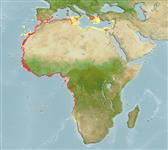Preferred temperature (Ref.
115969): 16.2 - 25.6, mean 19.2 (based on 58 cells).
Phylogenetic diversity index (Ref.
82804): PD
50 = 0.5000 [Uniqueness, from 0.5 = low to 2.0 = high].
Bayesian length-weight: a=0.01585 (0.01281 - 0.01961), b=2.94 (2.91 - 2.97), in cm Total Length, based on LWR estimates for this species (Ref.
93245).
Τροφικό Επίπεδο (Ref.
69278): 3.6 ±0.59 se; based on food items.
Ελαστικότητα (Ref.
120179): Μεσαίο(α), ελάχιστος χρόνος για διπλασιασμό πληθυσμού 1,4 - 4,4 έτη (K=0.16-0.3; Fec = 480,000).
Prior r = 0.32, 95% CL = 0.21 - 0.48, Based on 1 stock assessment.
Fishing Vulnerability (Ref.
59153): Moderate vulnerability (36 of 100).
Climate Vulnerability (Ref.
125649): Low to moderate vulnerability (30 of 100).
